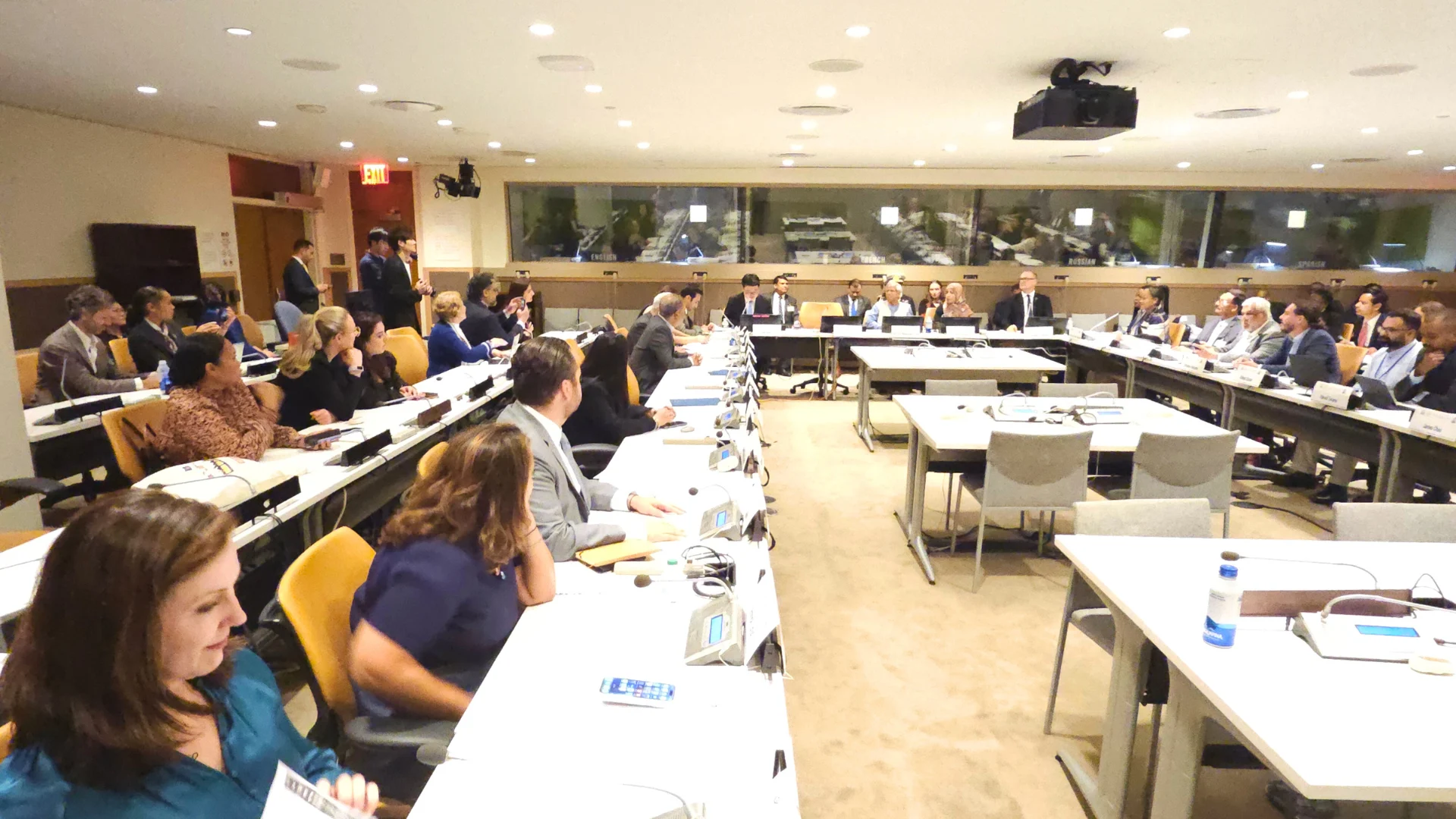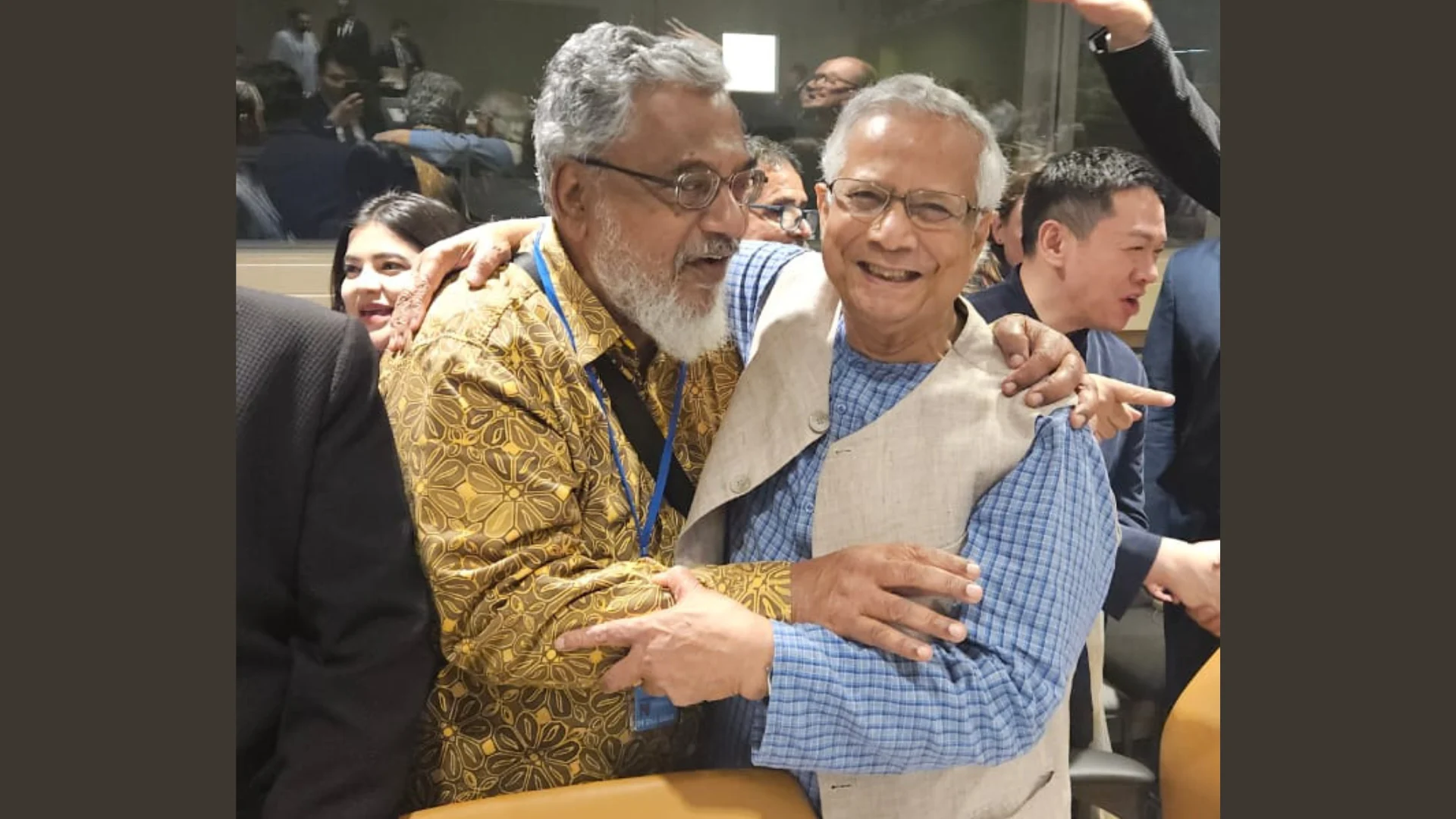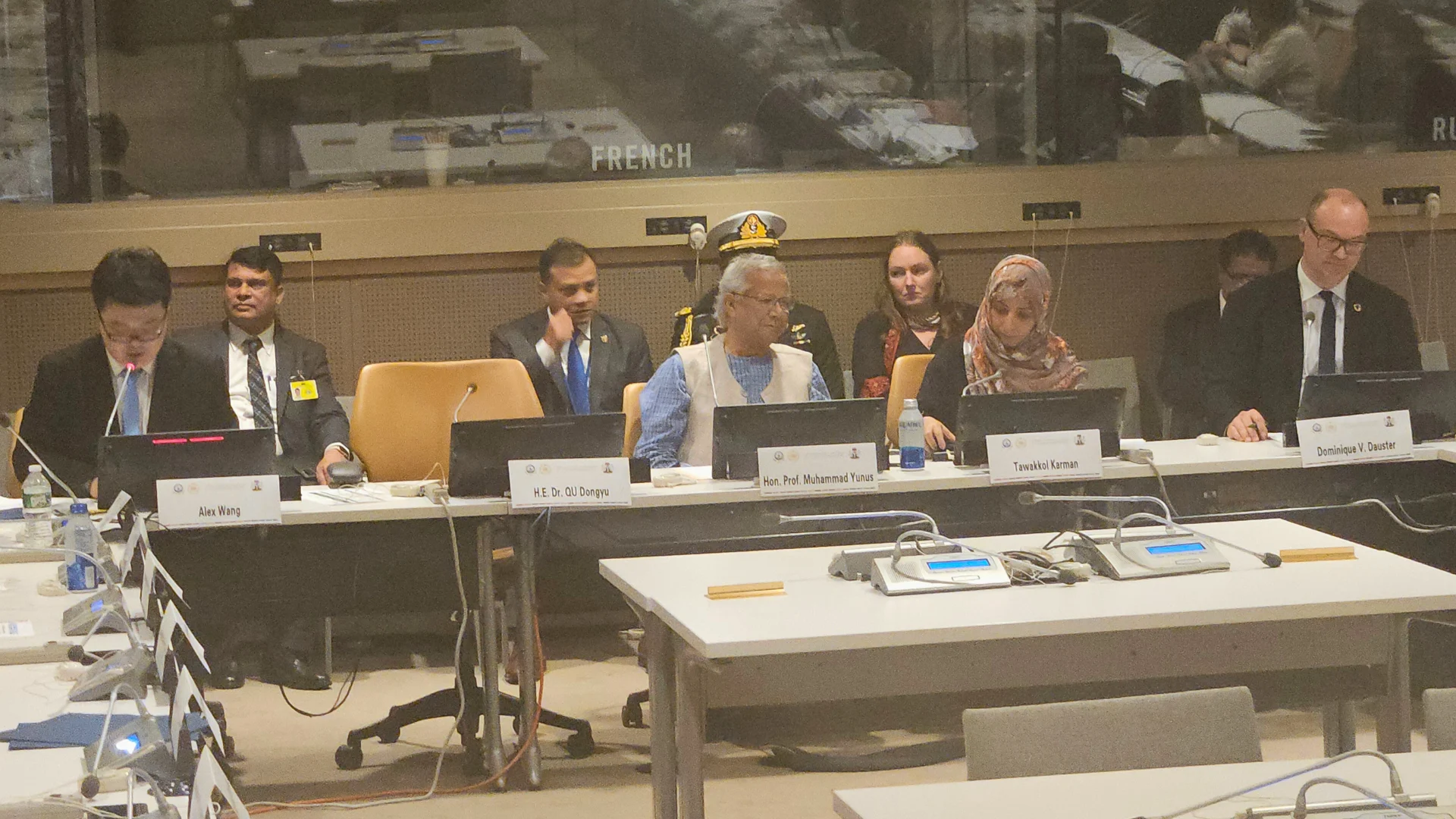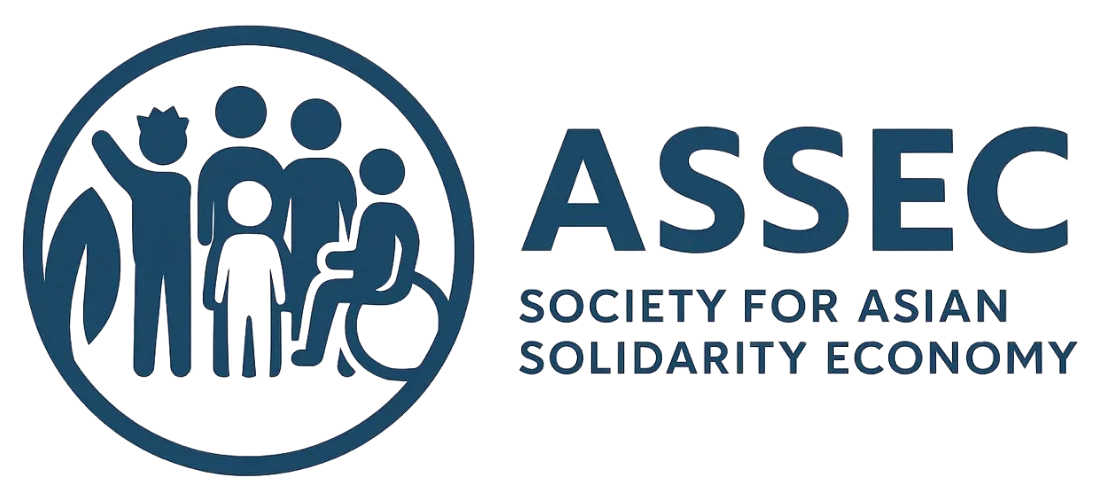
A question raised & answered by Prof Yunos
On Sept 22, 2025 at the UNGA side event in New York on Social Business, Youth & Technology, Prof Yunos started his speech by raising this question What kind of a world we want? What is our vision?
An outstanding human being, Prof Yunos is a person with many talents, achievements and roles- A teacher, an academic, a social banker, social business entrepreneur, people mobiliser and now chief adviser to the interim government of Bangladesh
Yet he speaks with the same conviction, dresses the same and is very people focused although now surrounded by security and government officials.
Prof Yunos affirmed that global conflicts undermine our shared vision for a sustainable future. He said that the SDGs cannot be fully realised within the current global system—a system still dominated by the relentless pursuit of profit over people. “We must move toward an economy that places human well-being, social justice and environmental stewardship above the narrow accumulation of wealth. This is not a utopian ideal. It is a necessary evolution,” Prof Yunus said. He affirmed that “business can and must exist to make a difference, not just a profit”.
For Prof Yunos the answer is development planning and implementation which gives priority to people and planate over profits. The challenge is to reverse the self-destruction towards public policies and programs which will direct public resources towards wealth sharing. Public and private sector to share this responsibility.
Denison Jayasooria attended in person this side event invited by Alex Wang is the Managing Director of the Global Committee on Social Business for the Sustainable Development Goals (SDG).
The speech is well documented through three media write ups and these are enclosed here for your reading.
News Coverage of Prof Yunos Speech
(Sept 22, 2025 @ UNGA Side event)
Media write up 1
Chief Adviser Professor Muhammad Yunus delivered the following Keynote Speech at UN High Level Side Event on Social Business, Youth and Technology at UN Headquarters in New York on Monday.
Excellencies, Distinguished Guests, Good afternoon.
It is truly an honour to return to this gathering—it feels like coming home. Over the years, I have shared ideas and dreams with all of you in this very event. When I first joined this event, I did so simply as Professor Yunus. Last year, I was welcomed for the first time as the Chief Adviser of the interim government of Bangladesh—and today, I stand before you again in that same role.
Yet, regardless of the title I hold, my mission remains unchanged: to build a world where opportunity, dignity and sustainability are within reach for all. Titles may vary, but the purpose endures—to shape a world where business serves not only profit but people, our planet, and the future we all share.
Today, more than ever, that future stands at a crossroads. Wildfires of climate change scorch the earth. The chasm of inequality grows deeper. Conflicts rage and the struggle for justice and peace tests our very humanity.
These crises are not isolated. They are intertwined—threads of a fragile tapestry, each pulling at the other, shaping the whole of our existence.
But let us remember this: the power to mend that tapestry does not lie in the past. It lives in the future we dare to imagine—and in the choices we make, here and now.
The path to a better world is not measured by yesterday’s failures. It is built with today’s courage, today’s action and today’s unwavering commitment to change.
Ladies and Gentlemen, Today, more than ever, the future stands at a crossroads. Wildfires of climate change scorch the earth. Inequality deepens. Conflicts rage. The struggle for justice and peace tests our very humanity. These crises are interconnected threads, each pulling at the other, shaping the whole of our existence. The power to mend this tapestry does not lie in the past—it lies in the future we dare to imagine, and in the choices we make here and now. The path to a better world is built with today’s courage, action, and unwavering commitment.
The persistent shadow of global conflict threatens peace, stability, and development. Wars and displacements ripple across borders, disrupt economies, endanger food security, and shatter human lives. In the face of these interconnected crises, old solutions are inadequate. What we need urgently is renewed multilateral diplomacy, deeper international cooperation, and collective commitment to sustainable development.
Many countries, including Bangladesh, are preparing to graduate from LDC status amid severe challenges. For Bangladesh, this includes hosting 1.3 million forcibly displaced Rohingyas, managing repeated climate shocks, and navigating global economic turbulence. In such a context, reducing UN budgets or shrinking official development assistance would be counterproductive. Instead, the world must redouble efforts to expand international support, provide technical assistance, and ensure a just transition for nations facing heightened vulnerability.
The persistent shadow of global conflict continues to threaten peace and stability worldwide. These are not isolated tragedies—they ripple across borders, disrupting economies, endangering food security and shattering human lives. In the face of such interconnected crises, we cannot resort to old solutions. What we need now—urgently—is renewed multilateral diplomacy and deeper international cooperation.
Media write up 2
Persistent shadow of global conflict threatens peace, development
Chief Adviser Muhammad Yunus delivers his Keynote Speech at the UN High Level Side Event on Social Business, Youth and Technology at UN Headquarters in New York on 22 September 2025.
Chief Adviser Muhammad Yunus delivers his Keynote Speech at the UN High Level Side Event on Social Business, Youth and Technology at UN Headquarters in New York on 22 September 2025. He made the remark while delivering his Keynote Speech at the UN High Level Side Event on Social Business, Youth and Technology at UN Headquarters in New York.
“Today, more than ever, the future stands at a crossroads. Wildfires of climate change scorch the earth. Inequality deepens. Conflicts rage,” the chief adviser said. In the face of interconnected crises, old solutions are inadequate. What we need urgently is renewed multilateral diplomacy, deeper international cooperation, and collective commitment to sustainable development. He said the struggle for justice and peace tests “our very humanity”, while these crises are interconnected threads, each pulling at the other, shaping the whole of their existence. “The power to mend this tapestry does not lie in the past—it lies in the future we dare to imagine, and in the choices, we make here and now,” Prof Yunus said.
He also said the path to a better world is built with today’s courage, action, and unwavering commitment. Wars and displacements ripple across borders, disrupt economies, endanger food security, and shatter human lives, the chief adviser said. He said: “In the face of these interconnected crises, old solutions are inadequate. What we need urgently is renewed multilateral diplomacy, deeper international cooperation, and collective commitment to sustainable development. “He said many countries, including Bangladesh, are preparing to graduate from LDC status amid severe challenges.
For Bangladesh, Muhammad Yunus said this includes hosting 1.3 million forcibly displaced Rohingyas, managing repeated climate shocks, and navigating global economic turbulence. In such a context, reducing UN budgets or shrinking official development assistance would be counterproductive, he said.
Instead, he said, the world must redouble efforts to expand international support, provide technical assistance, and ensure a just transition for nations facing heightened vulnerability. The chief adviser said the global conflicts do more than immediate harm; they also undermine our shared vision for a sustainable future.
As an advocate for the Sustainable Development Goals, he said he has long believed that these goals cannot be fully realised within the current global system—a system still dominated by the relentless pursuit of profit over people.
Under these conditions, the path to the SDGs can indeed appear bleak, he said. “But I am not here to dwell on the gloom. I am here to propose a shift—a transformation of the system itself,” he added. “We must move toward an economy that places human well-being, social justice and environmental stewardship above the narrow accumulation of wealth. This is not a utopian ideal. It is a necessary evolution,” Prof Yunus said.
He said at the heart of this new economy lies social business since social business is not a niche concept—it is a fundamental principle: that business can and must exist to make a difference, not just a profit.
It began humbly, with a one-dollar loan but today it has grown into a global movement, he said.
He also said from healthcare and renewable energy to education and even sports, social businesses are showing that it is possible to tackle the world’s most pressing challenges while remaining economically sustainable.
“They are living proof that another world is within reach—a world where commerce serves humanity, where growth includes everyone and where profit is measured not only in financial returns but in lives improved, communities strengthened and our planet healed,” the chief adviser said.
Noting that the current civilization is on a self-destructive path—one defined by endless extraction, consumption and accumulation, he said the people are endangering the very planet that sustains them.
“To change course, we must build a new civilization—one motivated not by greed but by a shared commitment to solving human and planetary challenges,” Prof Yunus said. He said in this new world, wealth must be shared, not concentrated.
“Power held in too few hands weakens the whole of society. And business must be redefined—not as a vehicle for personal profit, but as an engine for social good,” he added.
Prof Yunus said this is the promise of social business and this is how we will truly achieve the Sustainable Development Goals. But, he said, this new civilisation will not be built by the same minds that created the old one.
“It will be designed and driven by young people—the architects of the future. Unlike previous generations, shaped by outdated systems, today’s youth see what could be, not just what is. Their imagination is limitless,” the chief adviser said. He mentioned that he often says: “Where imagination leads, innovation follows.”
“If we can imagine it, it can happen. If we don’t, it never will,” he said, encouraging young people to channel their creativity into social business—where real, sustainable solutions to climate change, unemployment, poverty and inequality are born. At this pivotal moment, he called upon the youth of the world to lead—not tomorrow, but today. “Dream boldly, but act deliberately. Change doesn’t have to start big.”
About the rise in technology, Prof Yunus said the world stands at the brink of a new technological era—one defined by artificial intelligence, big data, renewable energy and other transformative innovations. He said these tools have the power to reshape industries, societies, and the very fabric of human progress. “But their promise is paired with profound responsibility. Will these technologies become a blessing for humanity—or a source of harm? The answer is not yet written. It will be determined by the choices we make today and by the values we instill in tomorrow’s leaders—especially our youth,” Muhammad Yunus said.
He said the future of technology must be shaped not by ambition alone, but by conscience. Not by competition, but by collaboration. Not for the few, but for all. “Let us ensure that this new technological era becomes an era of empathy, equity, and shared progress,” the chief adviser said.
Media write up 3
Prof Yunus asks youths to build 3-zero clubs to help change the world (Sep 23, 2025 15:53)
Chief Adviser Professor Muhammad Yunus has urged young people to build Three Zero Clubs with the aim of changing the world.
“I speak of a world of ‘three zeros’: Zero Net Carbon Emissions, Zero Wealth Concentration to End Poverty, and Zero Unemployment by unleashing creativity in all,” he said while delivering his keynote speech at the UN High-Level Side Event on Social Business, Youth and Technology at the UN Headquarters in New York on Monday, BSS reports.
Prof Yunus also emphasised Zero Waste and called for being a part of the UN Secretary General’s “Zero Waste Initiative.” “This is not a dream. It is already becoming a reality,” he said. “That’s why we’re encouraging young people everywhere to form 3-Zero Clubs—spaces where individuals become 3-Zero people,” he added.
The Chief Adviser said a 3-Zero person commits to living sustainably, minimising waste, and embracing social entrepreneurship, while striving to contribute nothing to global warming, nothing to wealth inequality, and nothing to unemployment. He said as more join this movement, these clubs grow into 3-Zero families, 3-Zero villages, 3-Zero cities—and one day, a 3-Zero world. “It starts with a single step. But together, those steps can change the world,” he added.
Prof Yunus said he has always believed this forum is more than a place for speeches—it is a place for inspiration. “In these turbulent times, true transformation lies in our unity. If we join hands—harnessing the power of social business, the energy of youth, and the potential of technology—we can untangle even the most complex global crises,” he said.
“Let us become the architects of a new wave—a world built on justice, sustainability, and hope. A world where our collective dreams ignite a new dawn for all of humanity,” he added.



